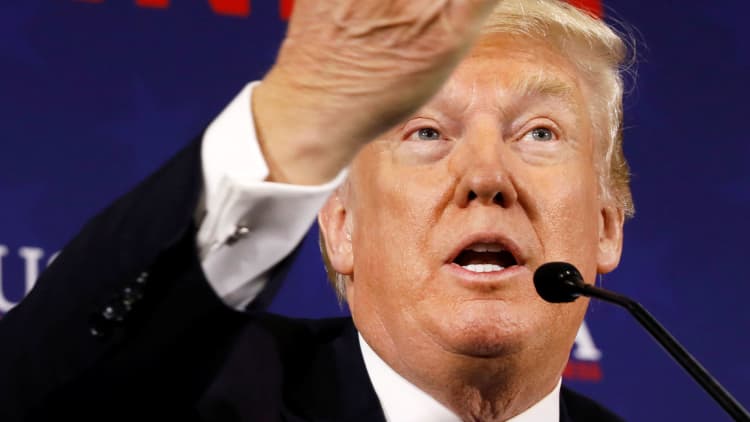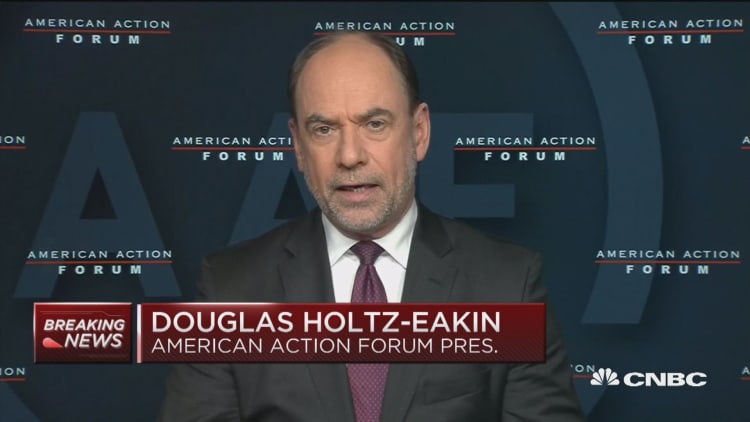
Donald Trump has decided to gamble his presidency on the idea that he can threaten big tariffs on China and force the world's second-largest economy to back down.
If he fails — and the odds are that he will — the fallout from a tariff battle with China could derail an otherwise strong U.S. economy, threaten Republican majorities in the midterm elections and turn the second half of Trump's first term into a dismal slog to avoid impeachment votes.
So far, the exact scenario that free traders inside the White House and on Capitol Hill feared is playing out. China scoffed at Trump's initial $50 billion in threatened tariffs and announced their own, aimed directly at Trump's red-state base with levies on agricultural and manufactured products.
Trump and his top trade negotiator, Robert Lighthizer, responded by chastising China for not immediately capitulating and announced plans on Thursday night for another $100 billion in tariffs. China, in classic trade war fashion, announced it would "counterattack with great strength" and fight the United States "to the end."
New National Economic Council Director Larry Kudlow, whose main job is to convince Wall Street and the rest of America that no trade war will actually happen, stepped up again Friday in a series of interviews to promise that this is all classic Trump, an aggressive negotiating ploy to get China to clean up its theft of intellectual property and forced technology transfers, among other abuses.
"This is not a trade war. There is no war here," Kudlow said. But he also said there was no timetable for negotiations and that tariffs could actually wind up going into effect. The fact is that Kudlow has no idea how any of this will play out, and neither do Trump or Lighthizer.
The president is approaching this like he does everything else, by talking tough and expecting his opponent to give in. Only it's not at all clear what a "win" in this trade fight would look like or what exactly the White House expects China to do to avoid the American tariffs going into effect.
The fact is that Kudlow has no idea how any of this will play out, and neither do Trump or Lighthizer.
Trump himself acknowledged in a radio interview aired on Friday that there could be "a little pain" in the trade dispute but that the ultimate outcome would be good for America's economy.
That little bit of pain could turn into a midterm election bloodbath for Trump's Republicans if things go wrong. China may export more products to the United States than the U.S. sends to China. But the Chinese have other ways of exacting pain, including making life difficult for U.S. companies operating in China, limiting Chinese tourism to the U.S., as well as curtailing the number of Chinese students who attend and pay full tuition at American colleges and universities. China could also reduce holdings in U.S. debt.
'This is nuts'
In the midterms, China could continue to target agricultural products in states where Republicans hope to pick up Senate seats and avoid a Democratic wave, including Indiana, North Dakota and Missouri. Nebraska GOP Sen. Ben Sasse was among the most critical of Trump's trade moves on Thursday.
"Hopefully the president is just blowing off steam again but, if he's even half-serious, this is nuts," he said. "China is guilty of many things, but the president has no actual plan to win right now. He's threatening to light American agriculture on fire. Let's absolutely take on Chinese bad behavior, but with a plan that punishes them instead of us. This is the dumbest possible way to do this."
Republicans in Washington are tearing their hair out over Trump's approach. He could be highlighting the strong economy, low unemployment rate and boost from the GOP tax cut bill.
Instead, he's injected massive volatility into the stock market, ratcheting up uncertainty for companies that export to and do business in China and threatening to worsen inflation through higher consumer prices.
"Wage and price pressures are mounting," Moody's Mark Zandi told me on Thursday. "Higher tariffs would only intensify these pressures and cost American jobs. Trump's tariff gambit better end up in avoiding higher tariffs or they will only add to the overheating risks that are high and rising."
All of this might be worthwhile if there were a clear outcome in sight that would benefit the United States. But there isn't. There is a chance that it will all end with some cosmetic announcement by the Chinese that they will reduce some trade barriers. But it's not likely to be anything monumental. And a small reduction in the U.S. trade deficit won't mean anything in real economic terms.
The alternative is that the talking war will turn into a real trade war that could slow U.S. growth, tank the stock market, cause Republicans to lose one or both houses of Congress in November.
And it could present the president with Democratic majorities eager to take whatever comes out of the Russia investigation and turn it into impeachment hearings if not actual impeachment votes.
—Ben White is Politico's chief economic correspondent and a CNBC contributor. He also authors the daily tip sheet Politico Morning Money [politico.com/morningmoney]. Follow him on Twitter @morningmoneyben.
WATCH: Douglas Holtz-Eakin and Ben White on Trump's trade & immigration policy



